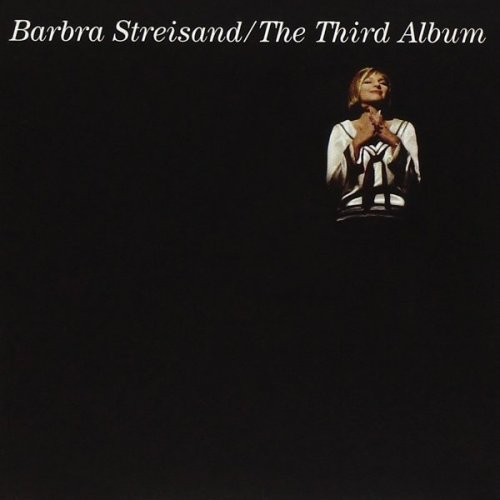Capilla Flamenca - Roland De Lassus: Bonjour mon coeur (2009)
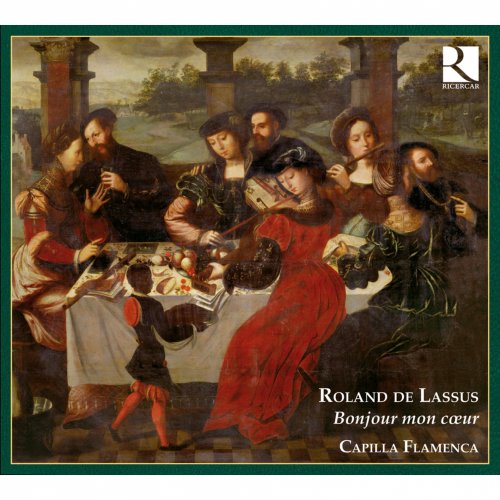
Artist: Capilla Flamenca, Marnix De Cat, Tore Denys, Lieven Termont, Dirk Snellings, Liam Fennelly, Thomas Baeté, Piet Stryckers, Jan Van Outryve, Patrick Denecker
Title: Roland De Lassus: Bonjour mon coeur
Year Of Release: 2009
Label: Ricercar
Genre: Classical
Quality: flac lossless +Booklet
Total Time: 01:04:06
Total Size: 294 mb
WebSite: Album Preview
TracklistTitle: Roland De Lassus: Bonjour mon coeur
Year Of Release: 2009
Label: Ricercar
Genre: Classical
Quality: flac lossless +Booklet
Total Time: 01:04:06
Total Size: 294 mb
WebSite: Album Preview
02. Le matin: l'amour naissant: Bonjour mon cœur
03. Le matin: l'amour naissant: Vive mon Dieu, à mon Seigneur
04. Le matin: l'amour naissant: Bonjour mon cœur
05. Le matin: l'amour naissant: O Herre Gott mein noth
06. Le matin: l'amour naissant: Bonjour mon cœur
07. Le matin: l'amour naissant: Passomezzo
08. Le midi: l'amour épanouï: Bonté divine, vien et monstre
09. Le midi: l'amour épanouï: O vin en vigne
10. Le midi: l'amour épanouï: Sauter, danser, faire les tours
11. Le midi: l'amour épanouï: Het was een aerdich vrouken
12. Le midi: l'amour épanouï: Ick sach vrou venus burseken
13. Le midi: l'amour épanouï: Een meysken op een ryvierken sadt
14. Le midi: l'amour épanouï: Dessus le marché d'Arras
15. Le midi: l'amour épanouï: Dessus le marché d'Arras
16. Le soir: l'amour éternel: Ardant Amour souvent me fait
17. Le soir: l'amour éternel: Zu aller stundt
18. Le soir: l'amour éternel: Ardant Amour fit Dieu
19. Le soir: l'amour éternel: La Nuict froide et sombre
20. Le soir: l'amour éternel: Du fons de ma pensée
21. Le soir: l'amour éternel: Hola Caron nautonnier infernal
22. La nuit: l'amour sommeillant: Doulce Mémoire
23. La nuit: l'amour sommeillant: Missa Doulce Mémoire: Kyrie
24. La nuit: l'amour sommeillant: Doulce Mémoire
25. La nuit: l'amour sommeillant: Doulce Mémoire
26. La nuit: l'amour sommeillant: Missa Doulce Mémoire: Agnus Dei
27. La nuit: l'amour sommeillant: Finy le bien: responce Doulce Mémoire
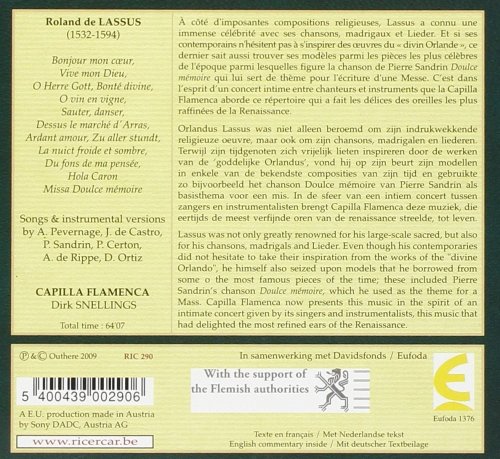
The movement to record Renaissance music in ways that illustrate its context has mostly bypassed Orlande de Lassus up to now. This is partly because his vast output is hard to get a grip on. Lassus was arguably music's first international star, and he was capable of bringing to his employers (mostly the Duke of Bavaria, already something of a cultural crossroads in the late sixteenth century) music from all around the continent. In the secular realm he wrote French chansons, Italian madrigals, and German songs modeled on both of these, and he influenced composers from the North Sea to the Mediterranean. This range of inspiration and influence is the subject of this Belgian release by the always enjoyable Capilla Flamenca and its superbly named countertenor, Marnix de Cat. Not that you would know that from the structure of the program, which falls into a very loose "day-parts of love" classification. But the singing is gorgeous throughout, and any lover of madrigal-type pieces will enjoy the performance of the moody French chanson La nuict froide et sombre, as well as other familiar Lassus pieces. The real attraction here is the way the album shows how, in the secular realm as well as the sacred, musicians even in the increasingly individualistic late sixteenth century tended to think in terms of chains of compositions. Only about half the program is by Lassus himself; the rest is by composers he inspired, or, in the case of the Pierre Sandrin chanson Doulce mémoire, who inspired him. The range of pieces associated with the chanson Bonjour mon coeur is especially interesting. Lassus' limpid setting of this deceptively simple poem by Pierre de Ronsard apparently became a hit and was manipulated by other song composers, keyboardists, and composers more oriented to sacred music who fitted the material with sacred texts, including Lassus himself after his employer's theology began to shift toward the counter-reformation. Another interesting and quite rare piece is the dialogic chanson Hola Caron (track 21), representing a conversations between Charon, the boatman of the river Styx, and a soul who has died of love and is thus not to be allowed to cross; it is a quasi-dramatic setting for two groups of voices, clearly influenced by the ideas in the realm of the Italian madrigal that would eventually lead to the creation of opera. The booklet notes by Ignace Bossuyt take some concentration (they begin with the somewhat tangential counter-reformation issue), but effectively introduce Lassus and his musical surroundings. The notes and texts appear in Dutch, German, French, and English. A treat for madrigal lovers of all stripes.
![Charles Owens Trio - 10 Years (Anniversary Edition) (2026) [Hi-Res] Charles Owens Trio - 10 Years (Anniversary Edition) (2026) [Hi-Res]](https://www.dibpic.com/uploads/posts/2026-02/1770942375_qq3q442wai8jz_600.jpg)
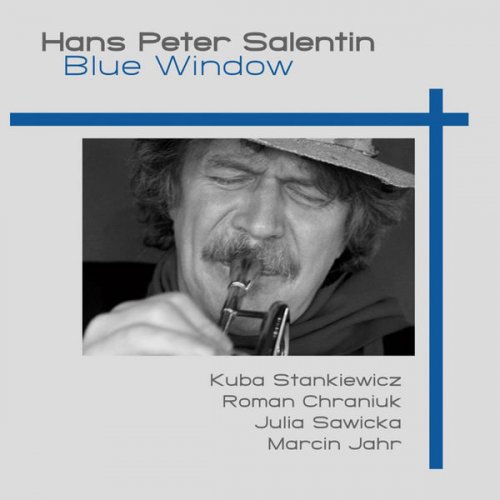



![Casiopea - Casiopea (1979) [2020 DSD] Casiopea - Casiopea (1979) [2020 DSD]](https://www.dibpic.com/uploads/posts/2026-02/1770891559_folder.jpg)
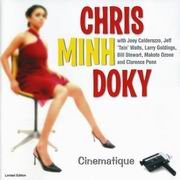
![Django Festival Allstars - Evolution (2026) [Hi-Res] Django Festival Allstars - Evolution (2026) [Hi-Res]](https://www.dibpic.com/uploads/posts/2026-02/1770746426_folder.jpg)
